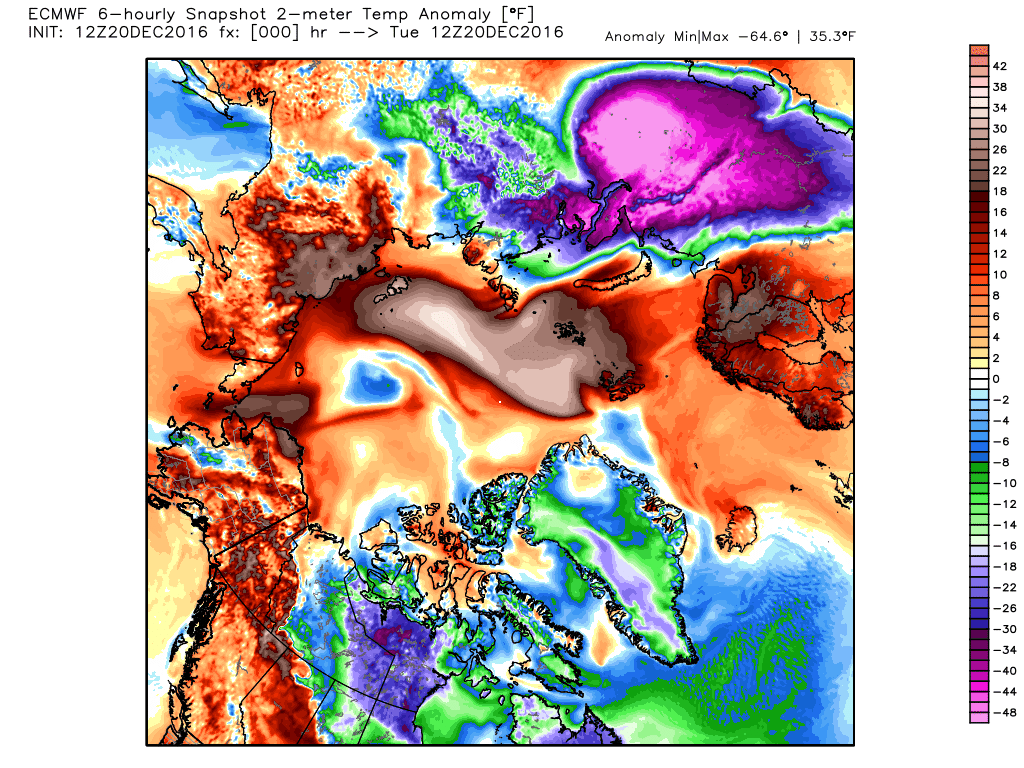|
BattleMoose posted:Because its stupidly expensive and as long as we are emitting co2, it will always be more cost effective to emit less than try to take it out of the atmosphere. Taking c02 out of the atmosphere is so unviable its not even discussed as an option. For all intents and purposes, once emitted it will persist for thousands of years. Direct air capture of CO2 is discussed as an option, and it's at least in theory not totally crazy expensive, just....way more expensive than not doing it. And also more expensive than switching to renewables. As far as magic technological solutions go its maybe one of the least bad. As always, it should be noted that trying to technomagically fix emissions without actually reducing our emissions is insanely stupid, basically impossible, and economically backwards. But if "well we could always spend trillions of dollars on a massive CO2 removal geo-engineering scheme" helps you sleep at night, then yes, it is a theoretical possibility and within the envelope of conceivable practical reality, provided it is coupled with radical emission reductions. And the CO2 we've emitted won't persist for thousands of years. For atmospheric CO2 it's on the order of decades, and even the shittiest end-state for natural sinks conceivable won't put it past a century. For oceans its more complicated, but still not thousands of years. Of course this point is completely academic since 50 years of 500ppm will gently caress us just as rightly as 5000. There is also the fact that if severe tipping points are passed, even reducing the CO2 concentration immediately to 280ppm won't necessarily cool the planet back to normal for a long time.
|
|
|
|

|
| # ? May 14, 2024 11:14 |
|
Morbus posted:Direct air capture of CO2 is discussed as an option, and it's at least in theory not totally crazy expensive, just....way more expensive than not doing it. This strategy is only an option if we are burning fossil fuels, it requires a *VERY* concentrated mass of air, that only exists in the presence of burning fossil fuels. It cannot be used to remove CO2 from the general atmosphere. Morbus posted:And also more expensive than switching to renewables. As far as magic technological solutions go its maybe one of the least bad. As always, it should be noted that trying to technomagically fix emissions without actually reducing our emissions is insanely stupid, basically impossible, and economically backwards. But if "well we could always spend trillions of dollars on a massive CO2 removal geo-engineering scheme" helps you sleep at night, then yes, it is a theoretical possibility and within the envelope of conceivable practical reality, provided it is coupled with radical emission reductions. I literally just wrote that removing co2 isn't an option. How you got the idea the possibility of massively removing co2 from the atmosphere, helps me sleep at night I don't know. Well it doesn't, because I don't think it has any capacity to happen and I don't believe in fairy tails. Unless a miracle. Morbus posted:And the CO2 we've emitted won't persist for thousands of years. For atmospheric CO2 it's on the order of decades, and even the shittiest end-state for natural sinks conceivable won't put it past a century. For oceans its more complicated, but still not thousands of years. Of course this point is completely academic since 50 years of 500ppm will gently caress us just as rightly as 5000. There is also the fact that if severe tipping points are passed, even reducing the CO2 concentration immediately to 280ppm won't necessarily cool the planet back to normal for a long time. Thousands of years. quote:The models agree that 20–35% of the CO2 remains in the atmosphere after equilibration with the ocean (2–20 centuries). Neutralization by CaCO3 draws the airborne fraction down further on timescales of 3 to 7 kyr. That's 3-7 thousand years at the end there. BattleMoose fucked around with this message at 13:04 on Dec 20, 2016 |
|
|
|
The fairy tale is thinking you are ever going to convince people to reduce their quality of life. Setting up a massive CO2 scrubbing industry would actually be a good thing for people and the economy and renewable energy, so there is a chance it might happen. Renewables are in the same class of progress which is why they ARE happening. But its a long term plan that does rest on energy emitters transitioning to renewables, so its not going to save us - just help a bit in the long term.
|
|
|
|
GlyphGryph posted:The fairy tale is thinking you are ever going to convince people to reduce their quality of life. Start by doing what is necessary, then what is possible, and suddenly you are doing the impossible.
|
|
|
|
Well instead we delayed doing what was necessary, and now what is possible is not sufficient and what is necessary is impossible. We do not have the luxury of screwing up our first attempt at this and having another go later, which is probably how most of human progress happened.
|
|
|
|
Morbus posted:Well you conduct a controlled experiment where you dump a bunch of sulfates into the air and see what happens. Short of that you obviously aren't going to "prove" anything. But there are a lot of reasons why you can be reasonably certain about the broad scope and effects of sulfate geoengineering: This is from a bit back, but I appreciated your attempt to defend sulfate geoengineering even though I'm skeptical that it's a good idea. Pointing out that it's effect is similar to a large sustained volcanic eruption is a good approach. It reminds me of how particle physicists addressed concerns during the runup to the operation of the LHC about the possibility of it creating a black hole/some sort of exotic matter that could potentially destroy the earth. The most effective response was appealing to the cosmic ray energy spectrum (which extends orders of magnitude higher than the LHC collision energy), and pointing out that the continued existence of the sun and earth after billions of years of continual bombardment by much higher energy particles meant that operating the LHC was safe. However as you point out in this case the appeal to the existing natrual phenomena (volcanoes) isn't perfect as sulphate geoengineering would be a continuous, long term process while volcanic eruptions are short and episodic. It's not clear what the long term impacts would be, and I don't see how you guarantee there's no possibility of making things worse (which is the level of proof the general public would demand). It's probably not correct to say that large volcanic eruptions don't have catastrophic effects on ecosystems, haven't they been implicated as possible causes for major extinctions and the initiation of ice ages? GlyphGryph posted:Setting up a massive CO2 scrubbing industry would actually be a good thing for people and the economy and renewable energy, so there is a chance it might happen. Renewables are in the same class of progress which is why they ARE happening. On the subject of crazy geoengineering schemes, I always thought iron fertilization was a clever idea. Instead of coming up with a radical new CO2 scrubber technology, use existing technology (phytoplankton). The ocean is large so presumably the necessary scale could be achieved. It's a shame that the experimental trials didn't seem to work out. It would be difficult anyway to demonstrate it wouldn't cause large scale disruption of the marine ecosystem (or at least, even more large scale disruption on top of what we're already doing with CO2).
|
|
|
|
Nocturtle posted:However as you point out in this case the appeal to the existing natrual phenomena (volcanoes) isn't perfect as sulphate geoengineering would be a continuous, long term process while volcanic eruptions are short and episodic. It's not clear what the long term impacts would be, and I don't see how you guarantee there's no possibility of making things worse (which is the level of proof the general public would demand). It's probably not correct to say that large volcanic eruptions don't have catastrophic effects on ecosystems, haven't they been implicated as possible causes for major extinctions and the initiation of ice ages? The snowball earth hypothesis posits that the entire earth was glaciated and over a long enough time period, the accumulated CO2 emissions from volcano eventually induced a strong enough greenhouse effect to melt the ice. The sulfates that volcanoes emit have a cooling effect and in the short term this cooling effect is much stronger than the CO2 that it also emits. But the sulfates are very short lived compared to the CO2 so CO2 was able to persistently accumulate. We have already actually conducted our own little sulfate experiment. During the mid 20th century we emitted huge amounts of sulfates, largely from vehicles. Then came the clean air acts that essentially limited sulfate emissions from vehicles. Between 1940-1970, there was a warming hiatus as it were and anthropologically produced sulfates were the cause. And volcanoes have emitted huge amounts of sulfates also cooling the planet in the short term. If we were to emit sulfates to cool the climate, we aren't entirely in uncharted territory. Its utterly awful that its come to this but things are going to get so bad I think that the decision will be made. It does have the nice characteristic that it can essentially just be turned off.
|
|
|
|
Sulfates is completely untenable because an over all global cooling of 1C with sulfates does not equal a distributed regional cooling of 1C. Some areas will be unaffected and others will have total crop failures and snow in July. Even if you seed the air evenly, the upper atmosphere will redistribute it very quickly. Some mechanisms are understood but predicting them is virtually impossible now. There's too much of a chance it would start a moderate hot war and if that would happen hundreds of years of climate effort would be undone in a few weeks.
|
|
|
|
Will that sort of rationale actually stop it from being done, though? Without a world government the chances seem pretty high that one government or another will have the bright idea to try it, and then what? China blew up a satellite in low earth orbit generating ridiculous amounts of debris because their military wanted to show off. They totally will try something like this at some point as things get bad.
|
|
|
|
Uncle Jam posted:Sulfates is completely untenable because an over all global cooling of 1C with sulfates does not equal a distributed regional cooling of 1C. Some areas will be unaffected and others will have total crop failures and snow in July. There are a lot of uncertainties here, but there isn't any strong basis to say, for example, that some areas "will" be unaffected and others will have total crop failures and snow in July. The only really accurate statement that can be made about the regional side effects of sulfate injection are that: 1.) we really don't know, 2.) to the extent that people have tried to model it, the side effects are of course proportional to the amount of sulfate injection. Depending on the specifics of the model, you can end up with situations that are relatively benign and where changes in regional precipitation mostly act to counteract changes that have occurred due to global warming...or you can end up with situations where you introduce new droughts or exacerbate existing in e.g. Africa and Asia that would have serious consequences. One thing that is generally true is that the models which introduce modest amount of aerosols, to counteract modest amounts of radiative forcing (in line with an RCP2.6-4 kind of situation), tend to produce more benign outcomes. Models that introduce larger amounts of aerosols to counteract business-as-usual scenarios vary a lot more in their outcomes. Uncle Jam posted:Even if you seed the air evenly, the upper atmosphere will redistribute it very quickly. Some mechanisms are understood but predicting them is virtually impossible now. I don't think its accurate to say predicting distributions is "virtually impossible", just that there are a lot of uncertainties and the distributions you end up with vary greatly depending on the injection strategy modeled. Existing climate models to agree on certain broad features and trends, though. In any case, it's not really my intent to "defend" or advocate sulfate aerosol injection. I am just firmly in the camp that this is something we can better understand, and *must* better understand, so that we can make informed decisions in the future. I really, really don't think anyone can take this option off the table. One, because it may be necessary. Two, more importantly, because some government somewhere may decide it is. It's an eventuality that needs to be planned for, just like the myriad other undesirable consequences of climate change.
|
|
|
|
What I see as a fairly plausible scenario is that you begin with unilateral action by a number of countries. In particular large countries (or for that matter, corporations) that nobody particularly wants to mess with, that aren't terribly democratic, and can start by dispersing sulphates over unpopulated areas or oceans (this won't stop people from being adversely affected, but it *will* make it less than obvious to attribute effects to particular efforts, which will quell at least internal opposition). As effects increase and there's more data to see how exactly things are happening, folks will get angry, and assuming WWIII doesn't start there and then (and I dunno, I don't think this would happen) people will end up signing treaties that would lead to a global approach. Hopefully at this point we would have enough data to make it work without screwing too many people over. The alternative is that the world comes together to ban geo-engineering, a possibility I think is about as likely as banning fossil fuels. Fangz fucked around with this message at 20:39 on Dec 20, 2016 |
|
|
|
Morbus posted:There are a lot of uncertainties here, but there isn't any strong basis to say, for example, that some areas "will" be unaffected and others will have total crop failures and snow in July. The only really accurate statement that can be made about the regional side effects of sulfate injection are that: 1.) we really don't know, 2.) to the extent that people have tried to model it, the side effects are of course proportional to the amount of sulfate injection. Depending on the specifics of the model, you can end up with situations that are relatively benign and where changes in regional precipitation mostly act to counteract changes that have occurred due to global warming...or you can end up with situations where you introduce new droughts or exacerbate existing in e.g. Africa and Asia that would have serious consequences. I'm not even talking climatology though, for the distribution in the stratosphere, because that's all about forecasting. We can be somewhat sure of what is going to happen with atmospheric conditions 1 or 2 weeks ahead, but for sulfate transport you'd need at least a year and a half of accurate modeling. That is an absurd dream.
|
|
|
|
The British are coming!quote:Britain is preparing to move its research station in the Antarctic 23km further inland because it is under threat from a growing crack in the ice. The perspective coming out of IJIS is not great. Arctic sea ice extent was up +87,489 sq km for December 20th, +64,298 sq km on the 19th and +44,312 km sq km on the 18th. A day lapse in observations from the 16th in conjunction with the 17th averaged a bit under +80,000 sq km for each day, which is close to the +82,554 sq km on the 15th; this completes the series since I last checked. I say not great because the big driver of increase has now ceased being so - Hudson Bay is basically done, and it went fast. Oh, and here's how area looks with our projection thresholds - better, but the decrease in growth could be a problem: Evil_Greven fucked around with this message at 05:58 on Dec 21, 2016 |
|
|
|
Uncle Jam posted:I'm not even talking climatology though, for the distribution in the stratosphere, because that's all about forecasting. We can be somewhat sure of what is going to happen with atmospheric conditions 1 or 2 weeks ahead, but for sulfate transport you'd need at least a year and a half of accurate modeling. That is an absurd dream. There have been plenty of attempts to do such long term modeling. The results have been anything but consistent or certain, but there is some agreement on broad features. I'm not qualified to say whether or not such attempts are absurd or not, although it's worth pointing out that climate models, in general, need to account for aerosol transport over multi-year time frames, and there has been on-going effort over decades to refine such models and compare them to observation. If you have particular objections over the ability of climate modeling to assess something like stratospheric sulfate injection or aerosol transport in general, I would be honestly interested in hearing more about them.
|
|
|
|
What would be the effect on sea level rise of the therhomaline circulation shutting down? A lot of fresh water would first need to flow into the Atlantic for this to happen, of course, but wouldn't the resulting decreased temperatures in the North Atlantic slow/stop the glacier melts?
|
|
|
|
BattleMoose posted:Because its stupidly expensive and as long as we are emitting co2, it will always be more cost effective to emit less than try to take it out of the atmosphere. Taking c02 out of the atmosphere is so unviable its not even discussed as an option. For all intents and purposes, once emitted it will persist for thousands of years. Lame! You'd think if they've got oxygen concentrators in nursing homes and whatnot that trap O2 in a solid matrix under certain pressure conditions you'd be able to do something similar with CO2. Especially since it's got that equilibrium in water thing to play around with.
|
|
|
|
I'm sure there's all sorts of ways to trap CO2, the trick is in doing it at scale and efficiently (i.e. generating much less CO2 in the capture process than you are capturing.) It also has to be trapped basically forever for all intents and purposes.
|
|
|
|
Morbus posted:There have been plenty of attempts to do such long term modeling. The results have been anything but consistent or certain, but there is some agreement on broad features. I'm not qualified to say whether or not such attempts are absurd or not, although it's worth pointing out that climate models, in general, need to account for aerosol transport over multi-year time frames, and there has been on-going effort over decades to refine such models and compare them to observation. I'm not talking about climate modeling, because it's clearly insufficient because the regional effects matter with uneven sulfate distribution, which aren't covered by climate modeling by definition. You have to extend forecasting much further into the future instead, which people have been trying for decades anyway. Over some decades we've gone from 3 days to like 8 days of better than chance forecasting so yeah I think predicting long term regional effects is absurd, but necessary for atmospheric injections.
|
|
|
|
Regional climate modelling is the topic of a lot of current research. The 3 days to 8 days stuff is weather modelling and not really related to questions about sulphate injection. It's not really necessary to predict whether it'd rain next friday because of sulphates, it is important to look at if the average amount of rain over the next decade will rise or fall (or whether we increase the number of extreme rain events). The latter is much more plausible, though obviously still difficult.
Fangz fucked around with this message at 14:24 on Dec 21, 2016 |
|
|
|
Nocturtle posted:On the subject of crazy geoengineering schemes, I always thought iron fertilization was a clever idea. Instead of coming up with a radical new CO2 scrubber technology, use existing technology (phytoplankton). Pellisworth's posts on the subject a while back were interesting to read: http://forums.somethingawful.com/showthread.php?threadid=3453503&pagenumber=2&perpage=40#post398359415 http://forums.somethingawful.com/showthread.php?threadid=3453503&userid=0&perpage=40&pagenumber=15#post399175958
|
|
|
|
Fun fact: Parts of the Arctic will be 50 degrees (F) above normal tomorrow and nearly above freezing at ground level. As a reminder, this happened last year as well, with the result that it "brought so much heat and humidity to this otherwise frigid and dry environment that it thinned and shrunk the sea ice cover during a time of the year when the ice should have been growing thicker and stronger." And we already went through that once this year and are already on pace to have record low ice volumes. Most of the recent gains in extent are thin ice that can't stand up to a violent storm, which besides churning and breaking the ice will pull up warmer water from deeper in the ocean, thus melting the ice from the top, bottom and the sides. “In our study, we found that the thinnest ice was completely melted out by the storm,” said Alek Petty, a co-author of the study and a sea ice researcher at Goddard. “Maybe in the coming years, if we start with a thinner winter ice pack we’ll see extreme events like these cause even bigger melt-outs across the Arctic.” Well, what do you know! Edit: As an addendum, here is last year's average temperature graph of north of 80 degrees latitude. Notice the spike at the end of December:  And here is the same graph for this year. The current spike is going to increase dramatically in the coming days.  We have left normal behind and are moving towards a new normal. Mozi fucked around with this message at 22:06 on Dec 21, 2016 |
|
|
|
Fangz posted:Regional climate modelling is the topic of a lot of current research. The 3 days to 8 days stuff is weather modelling and not really related to questions about sulphate injection. It's not really necessary to predict whether it'd rain next friday because of sulphates, it is important to look at if the average amount of rain over the next decade will rise or fall (or whether we increase the number of extreme rain events). The latter is much more plausible, though obviously still difficult. You need to know the status of the stratosphere in detail to know where the sulfates will end up the most dense over time. THEN you can start climate modeling to understand impacts. You can't figure out transport through climate modeling. Yes you can forecast rain from forecast models but I'm not talking about that. You also need them to understand the current state and future state of upper atmosphere winds, pressures, temps, etc. Yeah a lot of people do regional climate modeling but it's no where near the granularity or confidence you need to model transport. I'm not even talking about computing effects from the sulfate, how sulfates actually change the local patterns, what kind of acid you could expect. Only how to calculate local density from injections over the lifetime of the sulfates presence, so you can start on all of that other stuff.
|
|
|
|
Morbus posted:There have been plenty of attempts to do such long term modeling. The results have been anything but consistent or certain, but there is some agreement on broad features. I'm not qualified to say whether or not such attempts are absurd or not, although it's worth pointing out that climate models, in general, need to account for aerosol transport over multi-year time frames, and there has been on-going effort over decades to refine such models and compare them to observation. One of the best ways I think to improve modeling is more sats, more frequent refresh of sat tech, and many many more earth stations. The models are already so impressive considering the lack of initialization data and noise in that data. A system for international calibration is in place, so we need more measurements with the latest devices and support for people to do those measurements. Having these things in place before the next natural sulfate injection is extraordinarily important. In a pipe dream world, a better international control of people making GBS threads up atmos sat bands with unlicensed transmissions. Some frequencies have become only useful for getting the atmospheric volume info out in the mid ocean, because of weak governments not policing frequencies.
|
|
|
|
How about a massive natural example of sulfate emissions? Would data like that help our models?quote:Researchers say the volcano is moving towards a threshold beyond which rising magma could spark the release of fluids and gases at 10 times the normal rate.
|
|
|
|
BattleMoose posted:This strategy is only an option if we are burning fossil fuels, it requires a *VERY* concentrated mass of air, that only exists in the presence of burning fossil fuels. It cannot be used to remove CO2 from the general atmosphere. Firstly, thank you very much for posting that paper. After reading it I have a few questions: 1. If only ~50% of the CO2 in the atmosphere can be expected to be removed "quickly" (i.e. on 10-100 year timeframes), is it correct to say that the absolute floor on the CO2 concentration we could achieve for the next >200 years, if we attained 0 CO2 emissions immediately, is around 340ppm? 2. Is it also correct to say that if we ever hit ~550ppm, we will be "locked in" at ~420ppm for at least a couple centuries? 3. If this is the case, is 350ppm a total pipe dream, cause it looks like it is. As far as direct air capture of CO2 goes, you *can* do it from ambient air, and it wouldn't be *impossibly* expensive or require impossible amounts of area. It is totally a pipe dream regardless, since the most optimistic figures are around ~20 tons CO2 removed per meter squared of surface area at a cost of ~$1000/ton/yr. So offsetting even a single coal plant (~10 million tons C/yr) would require a plant with a footprint on the order of a few square kilometers and cost 10 billion dollars per year. BUT, when you're talking about 100's or 1000's of years, I don't think the technological removal of CO2 from the atmosphere is far fetched, provided human society doesn't collapse completely in the next 100 years. It's not even super far fetched on a 100 year time frame, in terms of what might become technologically feasible.
|
|
|
|
Morbus posted:Firstly, thank you very much for posting that paper. After reading it I have a few questions: I am certainly not an expert on this topic and certainly not qualified to be able to answer these questions. I didn't even read that paper, just the abstract. But this paper and others that I am aware of discuss the persistence of CO2 or some fraction of our emitted CO2 in the timescales of millennium. Morbus posted:BUT, when you're talking about 100's or 1000's of years, I don't think the technological removal of CO2 from the atmosphere is far fetched, provided human society doesn't collapse completely in the next 100 years. It's not even super far fetched on a 100 year time frame, in terms of what might become technologically feasible. Maybe. Not burning coal is however infinitely easier than trying to remove CO2 from the atmosphere. And if we cannot even manage that, the idea of removing it is a total pipe dream. Its impossible to know what the future holds but in my opinion the idea of discussing removing CO2 from the ambient atmosphere its not within the realm of our reality, or our current technology. Cost is a very big part of it. Trees are probably still the best method of removing CO2 from the atmosphere and embedding it into a solid form (wood). I have often suggested that the most cost effective method of removing CO2 would be just to plant some trees, periodically cut them down, wrap them in plastic and put them in a hole in the ground, repeat until you have buried a sufficient amount of trees. This could be done with current mature forests, steadily remove wood and don't let it decompose. quote:You'd think if they've got oxygen concentrators in nursing homes and whatnot that trap O2 in a solid matrix under certain pressure conditions you'd be able to do something similar with CO2. Oxygen concentration, 209460 ppm. CO2 concentration, 400 ppm. (or whatever it is, from wiki, the exact number isn't necessary to show the difference to oxygen) Oxygen is also much more reactive than CO2, also making it much easier to remove (probably).
|
|
|
|
The Actic has started melting again. NSIDC extent (106 km) 2016, 12, 18, 11.785, 2016, 12, 19, 11.853, 2016, 12, 20, 11.983, 2016, 12, 21, 11.835, I steal most of this from the Arctic Sea Ice Forum, it's a great resource to lurk on and see what actual experts are doing.
|
|
|
|
Mozi posted:The Actic has started melting again.
|
|
|
|
Mozi posted:I steal most of this from the Arctic Sea Ice Forum, it's a great resource to lurk on and see what actual experts are doing. You know what the really depressing thing is? I showed these graphs to people who are not climate change deniers - they're leftists and they want the fash gone. They completely agreed with all the data, and got appropriately somber. And they asked me where I found this. So I said "a forum for Arctic Sea Ice enthusiasts" and I got laughed out of the room. Why would you know something so niche? Who would care about this so hard to make a forum?! dex_sda fucked around with this message at 00:30 on Dec 23, 2016 |
|
|
dex_sda posted:
Why don't you spend your free time watching reality TV, nerd.
|
|
|
|
|
Well it's mostly climatologists and glaciologists if that makes more sense. But yes, people could use a broader perspective. This all will be un-ignorable fairly soon in any case.
|
|
|
|
dex_sda posted:You know what the really depressing thing is? I showed these graphs to people who are not climate change deniers - they're leftists and they want the fash gone. They completely agreed with all the data, and got appropriately somber. And they asked me where I found this. Because you told them your source is some forum. Unless you can also provide a context of why the information in that forum is valid, they have every right to laugh at you.
|
|
|
|
"a forum for Arctic Sea Ice enthusiastsl" does sound pretty dubious
|
|
|
|
dex_sda posted:You know what the really depressing thing is? I showed these graphs to people who are not climate change deniers - they're leftists and they want the fash gone. They completely agreed with all the data, and got appropriately somber. And they asked me where I found this. Just tell them it's based on NASA satellite data. It doesn't matter who plotted the graphs. Edit: NASA has a version up at http://m.earthobservatory.nasa.gov/IOTD/view.php?id=89280 Let's see if it survives Jan 20. Fangz fucked around with this message at 03:26 on Dec 23, 2016 |
|
|
|
You white people are hilarious, going a full day without wasting, wowsie.. have you considered only drinking water? billions do that to survive all over the world. giving up cars is too hard.. hey poor people, lets make cheap energy/resources unavailable to you because they bad. that's the reason they're cheap you say? well heres a couple millions well just hand to your dictator to help ya out with that. hilarious. I hope climate scientists are as wrong as your economist, that's lretty much the poors hope, thanks for the crocodile tears.
|
|
|
|
Femur posted:You white people are hilarious, going a full day without wasting, wowsie.. Is there a way that you could massage this into something coherent?
|
|
|
|
Feral Integral posted:Is there a way that you could massage this into something coherent? Poor people should have been more educated and had fewer children.
|
|
|
|
Feral Integral posted:Is there a way that you could massage this into something coherent? yes, yall are bad people.
|
|
|
|
Femur posted:yes, yall are bad people. All people are bad people, be more specific.
|
|
|
|

|
| # ? May 14, 2024 11:14 |
|
TildeATH posted:All people are bad people, be more specific. people who cared about sweatshops. people who cared about the Amazons. People who care about the future. People who care. Don't feel good about trying, cause you didn't, and you won't. P.S. send boats later, don't scrap the shipping containers yall no longer need cause we dead. The survivors can use a decent home.thnx.
|
|
|



























